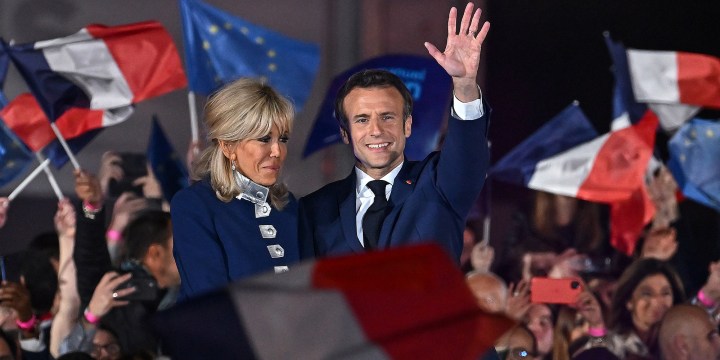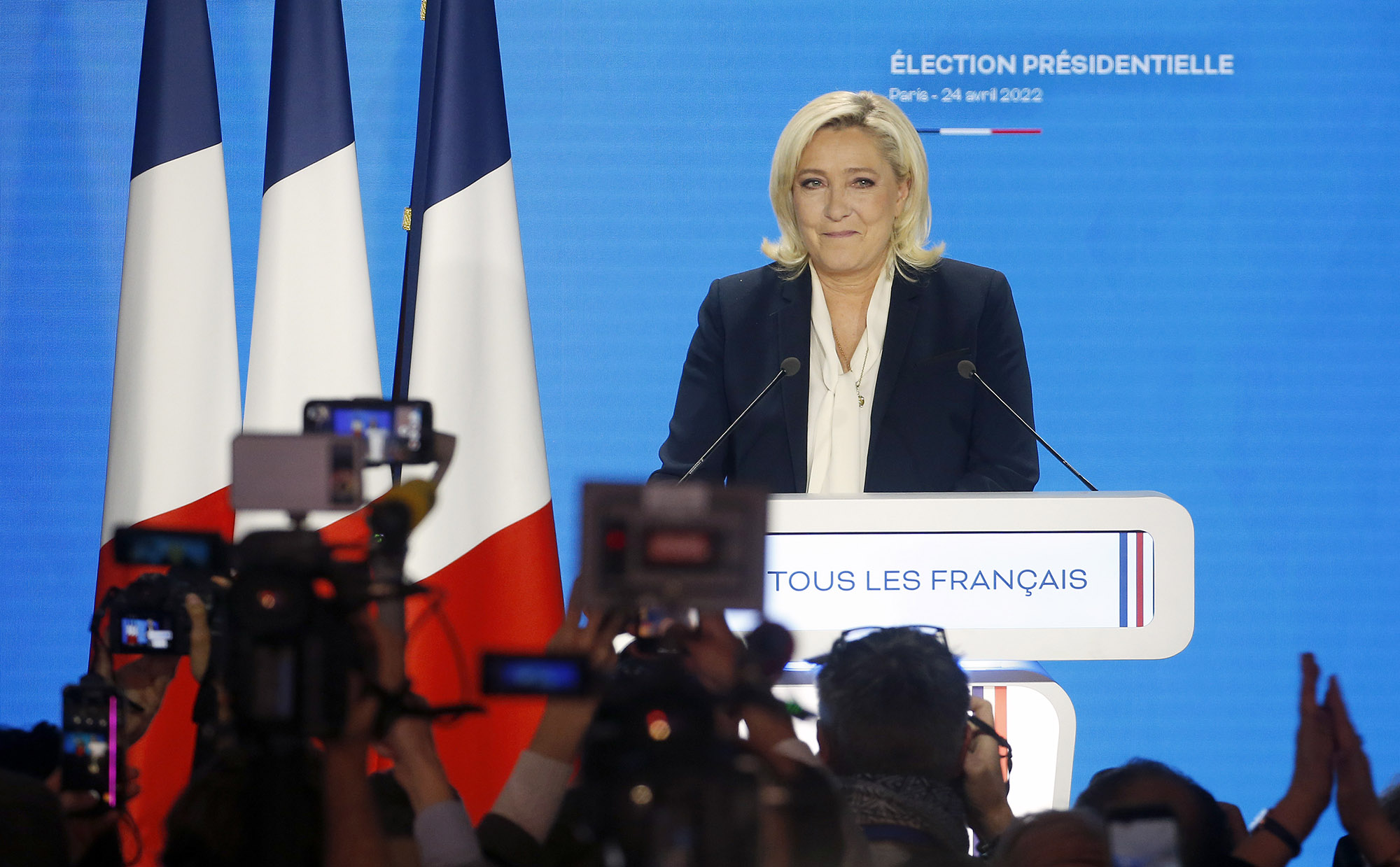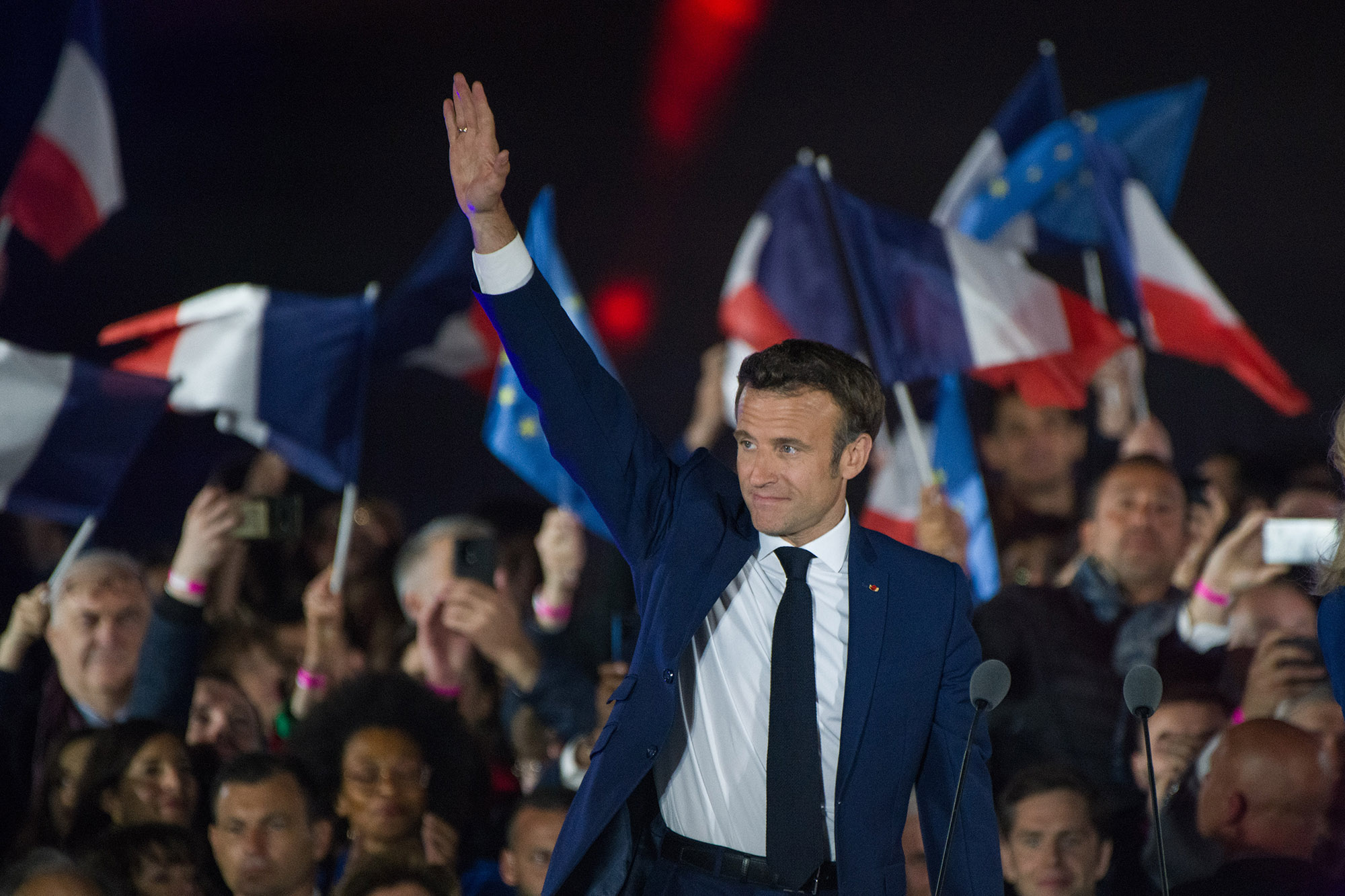PRO-EUROPEANS PREVAIL
Emmanuel Macron remains in charge, says grumpy French electorate

French President Emmanuel Macron comes through strongly in the French presidential runoff — support for the pan-European project and Ukraine remains in place. And a pro-Europeanist did well in Slovenia as well.
In the campaign leading to Sunday’s presidential run-off election in France, the two remaining candidates — incumbent President Emmanuel Macron of La République En Marche! and challenger Marine Le Pen of the National Rally — vied for the trust of a grumpy electorate increasingly concerned with those “kitchen table” issues. (Would that be what the French call “table de cuisine” issues, perhaps?)
For many voters, the really troubling questions were their concerns about the rising prices of goods and services such as petrol and food, their heavy tax burdens and Macron’s various pension and market reform plans.
Perhaps just as troubling to many was a sense that the incumbent president was more concerned with his large ideas for France’s (and his) place in international affairs than he was in addressing all those quotidian but real concerns of fellow citizens.

The far-right French party ‘Rassemblement National’ (RN) leader, Marine Le Pen. French President Emmanuel Macron defeated Le Pen in the final round of the French presidential election. (Photo: Thierry Chesnot / Getty Images)
Of course, even more concerning to many voters were the extremist positions his opponent had staked out over the years during her previous runs for the presidency, and, in the end, that was the key.
Macron had a clear field for his run to the centre — where the votes were. Ultimately, incumbent President Macron scored a convincing win of some 58.5% of those voting in the two-person race, although this result was down from his landslide win five years earlier against his same opponent.
A two-horse race
In pre-election bio-sketches posted by the New York Times on their website, they described the two candidates this way: “Mr. Macron, 44, is a former investment banker who was elected in 2017 with little political experience and is running for a second term. He was elected on the ruins of France’s traditional political parties with a strong pro-business platform. He overhauled the labour code, eliminated a wealth tax and reformed the national railway company. But his reformist zeal was tempered by massive strikes over his pension reform plans, Yellow Vest protests and the coronavirus pandemic.
“Mr. Macron’s challenger is Ms. Le Pen, 53, the perennial far-right leader who is running for the third time and who lost to him in 2017. She leads the National Rally, a movement long known for antisemitism, Nazi nostalgia and anti-immigrant bigotry that she has tried to sanitise and turn into a credible governing party. Ms. Le Pen has faced criticism about her past sympathy for President Vladimir V. Putin of Russia, but inflation and rising energy prices play well into her protectionist platform.

Front pages of the French newspapers show the centrist incumbent President Emmanuel Macron after beating his far-right rival Marine Le Pen for a second five-year term on 25 April 2022. (Photo: Jeff J Mitchell / Getty Images)
Reporting on Macron’s victory, the New York Times said, “Emmanuel Macron won a second term as president of France, triumphing on Sunday over Marine Le Pen, his far-right challenger, after a campaign where his promise of stability prevailed over the temptation of an extremist lurch.
“Projections at the close of voting, which are generally reliable, showed Mr. Macron, a centrist, gaining 58.5 percent of the vote to Ms. Le Pen’s 41.5 percent. His victory was much narrower than in 2017, when the margin was 66.1 percent to 33.9 percent for Ms. Le Pen, but wider than appeared likely two weeks ago. [The election has been run with efficiency and the results have been announced with admirable quickness, and with none of the charges of voter fraud now a standard element of American elections.]
“Speaking to a crowd massed on the Champ de Mars in front of a twinkling Eiffel Tower, a solemn Mr. Macron said his was a victory for ‘a more independent France and a stronger Europe’. He added: ‘Our country is riddled with so many doubts, so many divisions. We will have to be strong, but nobody will be left by the side of the road’.”
Le Pen’s ‘patriotic populism’
Despite her efforts to soften her public image, there remained the troubling xenophobic lineage of Marine Le Pen and her party, her stated intentions to cause a break in French connections to Nato and the EU, her staunch opposition to immigration and hijabs on heads in public, and a previous embrace of Vladimir Putin (including an infamous photograph of the two), and the awkwardness of her party’s borrowing operating funds from Russian and Hungarian banks, apparently because no French bank would lend her funds.
This time around, trying to sound rather less like a ranting, public scourge and scourer of France’s Augean political stables, Le Pen’s electoral strategy was to tamp down some of her more extreme views. Instead, she tried to wrap herself in the mantle of patriotic populism of the kind that has been a successful electoral gambit for people like Hungary’s Victor Orban or Donald Trump.
For Le Pen, however, that positioning just was not strong enough to outweigh the facts of the experienced and avowedly centrist (and mildly reformist) stance of the country’s incumbent president, even if Macron had a warmth deficit in the public mind. That deficit kept coming through in those “vox populi” comments where people told media interlocutors that he just wasn’t particularly interested in the problems of ordinary folk.

France’s centrist incumbent President Emmanuel Macron appears on TV under the Eiffel Tower in Paris above a banner declaring ‘Nous tous’ (all of us) after he beat far-right rival Marine Le Pen for a second five-year term. (Photo: Aurelien Meunier / Getty Images)
It didn’t seem to help Macron’s support that in the one debate the two candidates held just a few days before the election, he smirked his way through much of it. Perhaps he was bored, or perhaps he just was not willing to give his opponent the benefit of any respect as a serious politician. Nevertheless, he did hammer her over her ties to Russia and her demonstrated warmth towards Vladimir Putin, as if to say voters simply should not trust her with the nation.
Now that she has stumbled in presidential elections three times, it is worth considering if she might yield her place as party leader to a newer, fresher face, such as her niece, Marion Maréchal, a former National Assembly member for Le Pen’s party. Complicating things somewhat for Maréchal, however, is the fact she had joined the far-right party of Eric Zemmour earlier in the year. But maybe that was just a youthful fling and she can return, wiser, to lead the family’s mother church in the future.
Europe sighs with relief
Meanwhile, all across Western Europe (and in Washington, but certainly not in Moscow), you could hear presidents, prime ministers and foreign ministers exhaling in relief. Macron’s European counterparts were practically tripping over each other to send congratulations to the victor, or in releasing public messages to that effect.
Macron’s convincing win over Le Pen has become a reassuring message to the idea of Western, and Nato, unity over the war in Ukraine, and in Nato’s continuing relevance for the future.
As the Times also observed, “The French do not generally love their presidents, and none had succeeded in being re-elected since 2002, let alone by a 17-point margin. Mr. Macron’s unusual achievement in securing five more years in power reflects his effective stewardship over the Covid-19 crisis, his rekindling of the economy, and his political agility in occupying the entire centre of the political spectrum.”
In his victory speech, Macron said he would unite the country and that the French were all in it together, rather than belonging to separate, warring political tribes. Le Pen managed to say that the fight continued on into the parliamentary elections, although she never quite got around to congratulating her opponent on his victory, instead adding that her improved showing was the moral equivalent of a win.

French President Emmanuel Macron waves to supporters after the second round of voting in the French presidential election in Paris, France, on Sunday, 24 April 2022. Macron defeated far-right leader Marine Le Pen on a pro-business, pro-European Union platform, bolstering the bloc amid its worst security crisis in decades. (Photo: Nathan Laine / Bloomberg via Getty Images)
Theoretically, there had been several possible stumbling blocks for a Macron repeat win. First of all, a victory for him would be the first time in two decades a French president had been re-elected. In France’s complex electoral landscape, especially as the election also turned out to be taking place at the same time as a spring vacation break for many French families, some analysts speculated that the actual voter turnout would be the lowest in several decades.
Such a circumstance is generally not good for incumbents. That lower turnout could be interpreted as an electoral version of “a plague on both your houses” on the part of a large number of French voters.
There was also the fact that there were no calls from other candidates, now not in the two-person run-off, to throw their support behind the incumbent president to help stop the right-wing, xenophobic Marine Le Pen. This led some observers to believe the absence of such support would further encourage abstentions in this final round of voting.
In the end, it seems even unenthusiastic Macron voters held their noses and voted for him as the lesser of two evils. Meanwhile, the unsuccessful left-wing candidate (unsuccessful since he was not in the run-off as one of the top two candidates, although he did come close), Jean-Luc Mélenchon, told his supporters they should not countenance voting for Le Pen, but he also could not bring himself to tell supporters to vote for Macron to ensure Le Pen did not win.
Parliamentary ballot next
The French electoral system allows for many presidential candidates to run in an initial round. If one of them wins an outright majority, then it is game over. Otherwise, the top two candidates in the first vote face off in a second round, two weeks after the initial vote has taken place, this year again pitting Macron against Le Pen.
The seriously left-wing candidate, Mélenchon, ran third in the preliminary round, while Eric Zemmour’s right-wing nationalist party also finished out of the running.
Ultimately, while a majority of those voting in France decided to give Macron a second five-year term, this is not the end of things for France for this electoral cycle.
The French return to the polls in June to elect their country’s parliament, the National Assembly. Those members, like the president, will also serve five-year terms. Accordingly, it is possible voters may give the president a significant base of parliamentary support and thus considerable freedom of action, despite his weaker victory this time around than five years ago.
Alternatively, however, the results of that parliamentary election could also mean the president will need to contend with significant blocs of elected representatives who clearly do not support him, coming from either the left or the right of the political spectrum — or perhaps even from both political persuasions simultaneously.
In any of those three circumstances, the disaffection of significant numbers of voters (and abstainers) from Macron in the parliamentary election, even if the majority of voters grudgingly gave him a second term, would be felt through the composition of the new parliament. That could generate ongoing pressures on Macron over both his domestic and international agendas, although the powers of the French president should still make it possible for him to propel his ideas through the National Assembly.
Regardless of any domestic policy ructions among French politicians, in the larger picture, Macron’s victory provides a positive jolt to Western unity in confronting Russia’s continuing depredations against Ukraine.
This will be the case even though Macron stayed in touch with Putin (and had visited him in Moscow earlier) in an effort to tamp down the crisis. Moreover, at least so far, France has been less generous towards the Ukrainians in providing weapons to fight the Russian invaders, than have some other smaller nations. Given his second victory, perhaps Macron’s France will be more assertive on this score.
European unity
Meanwhile, European unity received another positive shot in the arm from an election in the Balkans, in Slovenia. There, prime minister Janez Jansa, a Trump admirer, appears to have lost to centrist rivals in that nation’s elections.
As the New York Times reported, “Europe’s once surging movement of nationalist populists suffered a significant setback in Slovenia on Sunday, in the formerly communist east, on the same day French voters rejected the far-right candidate Le Pen in their presidential election.
“In parliamentary elections in Slovenia, a noteworthy test for the appeal of right-wing populism, preliminary results indicated that the prime minister, Janez Jansa, an ardent admirer of former President Donald J. Trump, lost to centrist rivals…
“With 95 percent of the vote counted in an election that the opposition called a ‘referendum on democracy’, results indicated that Mr. Jansa’s Slovenian Democratic Party, competing against 19 rival parties, had won around 24 percent of the vote. That is far behind the 34 percent of its main rival, the centrist Freedom Movement, meaning that Mr. Jansa is highly unlikely to keep his post as prime minister.”
Meanwhile, another populist autocrat wannabe and favourite of both Vladimir Putin and Donald Trump, Victor Orban, remains firmly in charge in Hungary after his party’s victory in that country’s election on 3 April. While Ukrainian refugees have been allowed into Hungary, so far at least, the government there has declined to allow weapons headed to Ukraine to pass through Hungarian territory.
Nevertheless, overall, the cause for Western unity in the face of the Ukrainian crisis has been bolstered by the results of these two latest elections.
This should please the Ukrainian president as well as the American one — just as it should give Putin one more thing to think about as he contemplates his lack of success in his originally planned easy effort to return Ukraine to what he imagined would be the warm embrace of Mother Russia. DM

















 Become an Insider
Become an Insider
Comments - Please login in order to comment.